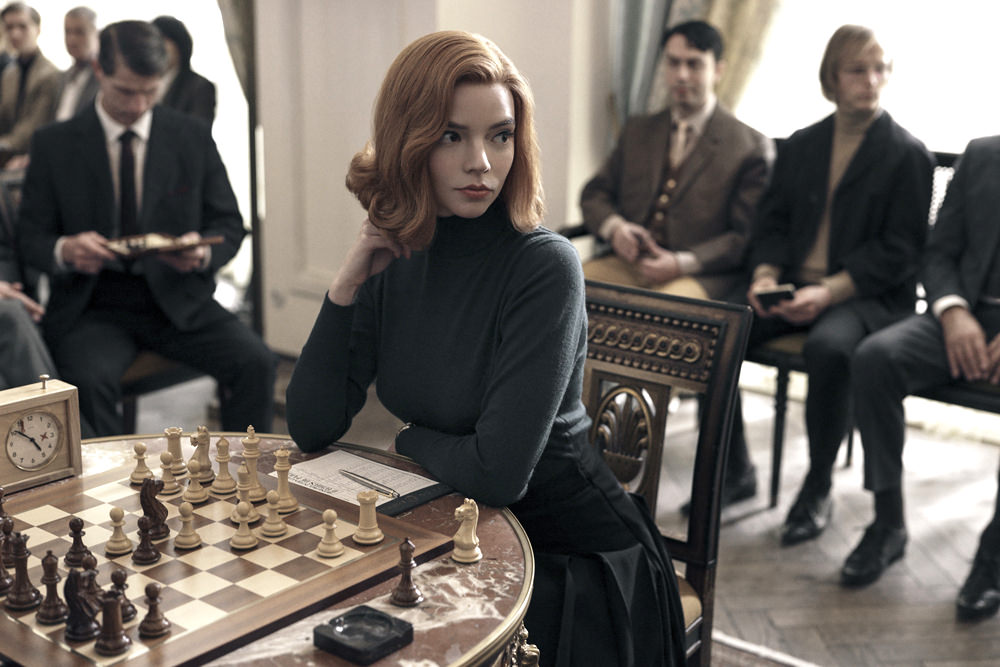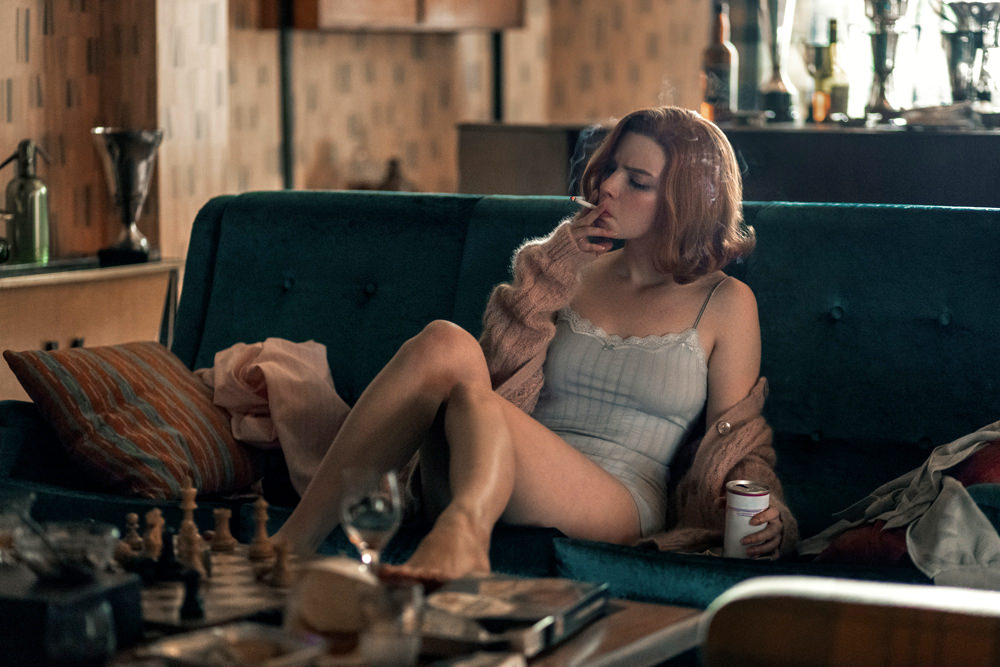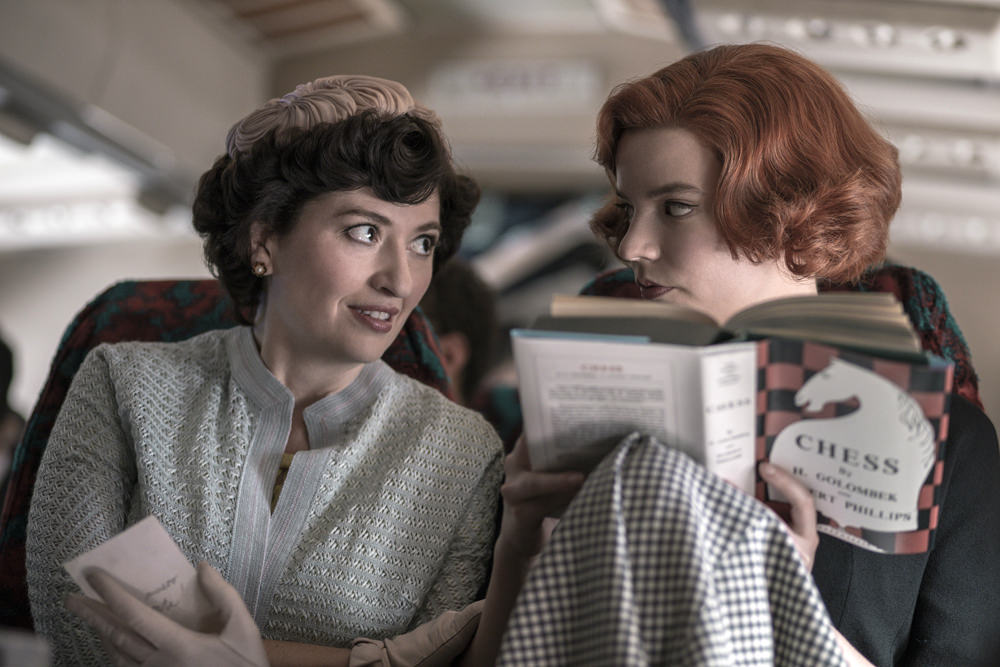
The Queen’s Gambit is a highly entertaining and occasionally engrossing limited series (dropping today on Netflix) that sometimes seems to work in spite of itself. Based on the 1983 novel of the same name by Walter Tevis, The Queen’s Gambit tells the story of Beth Harmon, a wildly talented, unsettlingly beautiful, effortlessly glamorous fuckup gliding through a rather stunningly charmed life, dragging no small amount of baggage behind her. Part Bildungsroman, part competence porn, part hero’s journey, with a little bit of romance, the development of some delicately beautiful friendships, and exquisite mid-century art direction and costume design, it wound up being one of our favorite watches of the year.
Without giving too much away, it’s a show that serves up characters and scenarios – a girl’s Catholic orphanage in the ’60s, an angry and distant adoptive father, a sad, alcoholic adoptive mother with broken dreams, relationships with men that feel like they’re right on the hairline of growing unhealthy if not flat-out dangerous – and uses them to provide the character with moments of growth and sometimes, moments of beauty. There’s a relationship with a male mentor character that gives you every reason to believe it’s about to turn dangerous at any moment (including the way each of the scenes are shot to give their orphanage basement meetings a sinister undertone) but never actually does. Instead, it develops into a friendship that becomes the basis of the entire story.

The effect of setting up all of these terrible scenarios only to see Beth float through all of them might sound like something too frivolous to be considered, just as the story of the rise of a chess champion to world-class status might sound like something too dull to sit through. We also would have thought that the story of an addict who remains stunning and stylish even at the depths of her addiction would come across too silly to watch or too cliched to rise above itself. Yet somehow, despite all of the reasons for it not to, The Queen’s Gambit works beautifully as an entertaining and (you’ll pardon the term) addictive diversion. And even though we’re lousy at chess and couldn’t begin to tell you if the show depicted its matches accurately, we were on the edges of our seats through most of them, based entirely on the performances and direction.
Aside from director Frank Scott’s smoothly confident work, the eye-popping sets and gorgeous mid-century production design of production designer Uli Hanisch and the absolute eye-candy of the costumes by Gabriele Binder, an enormous reason for the show’s unlikely success as entertainment is Anya Taylor-Joy herself, doing the best work of her life as rising chess wunderkind Beth. We kept thinking of Audrey Hepburn – not just because Taylor-Joy uses her similarly high-level fashion talents to model a succession of increasingly chic and glamorous costumes in mid-sixties styles, but because, like Hepburn, she has a quality of sharpness and lightness to her; an unexpected depth of intelligence combined with an almost unsettlingly photogenic face. If there’s one eyeroll-worthy trope that occurs in the story, it’s that pretty much every man who meets Beth falls in love with her, but with Anya Taylor-Joy giving such a charismatic performance, it’s not hard to see why.

Given the setting – the world of international chess championships in the 1960s – it makes a certain sense that a good deal of Beth’s most formative relationships would be with men – most notable and fun to watch among them is Thomas Brodie-Sangster as a slightly sleazy but brilliant grand master who taunts Beth, teaches Beth and like everyone else in the story, eventually becomes a bit infatuated with Beth. But her two most rewarding relationships are with women; the first is with Jolene, played with a light deftness by Moses Ingram, a young Black girl she meets on her first day at the orphanage who becomes a friend and protector and whose introduction to her life pays off beautifully much later in the story. The second formative relationship is with her adoptive mother, played with bemused and subtly broken delight by Marielle Heller. Heller’s more known for her directorial work in recent years (Can You Ever Forgive Me? and A Beautiful Day in the Neighborhood), but she gives such a lightly sad and wholesomely cynical sort of performance; a delicately threaded needle of contradictions that, come to think of it, tend to embody the series as a whole. A lightly sad, wholesomely cynical, romantically sinister series with a competent, charismatic, world champion as its lead, drinking, drugging and sleeping her way through her success in hopes of keeping some childhood demons at bay. A rock star with perfect hair and a killer game. We loved every minute of it.
[Photo Credit: Netflix]
Yea or Nay: Prada Herringbone Patchwork Denim Jacket and Skirt Next Post:
Raf Simons Spring 2021 Collection
Please review our Community Guidelines before posting a comment. Thank you!



